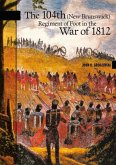On June 18, 1812, US President James Madison signed a declaration of war against Britain and launched an attack against the British colonies in North America in what he thought would be a quick and decisive land grab. Fearing invasion, the New Brunswick Legislative Assembly, along with the citizenry, prepared for war. When the invasion failed to materialize, neutrality ruled along the New Brunswick-Maine border and New Brunswick turned its attention elsewhere. It supported the naval battles along the coast between the Royal Navy and American privateers and the British campaigns in Upper and Lower Canada by sending reinforcements and supplies along the grand communications route. With Napoleon's defeat in Europe, Britain refocused its military on North America. In addition to sending reinforcements to the campaigns in Upper and Lower Canada, the British Army invaded Maine, seized disputed lands along the Penobscot River Valley, and redrew the map so that, for a time, much of northern Maine would become part of New Brunswick. In this revealing account, Robert Dallison examines the repercussions of the War of 1812 in New Brunswick and Maine, how a once-friendly border turned hostile, how wartime growth turned villages into towns, and how the post-war settlement of British soldiers and Black Refugees changed the composition of the province's population.








